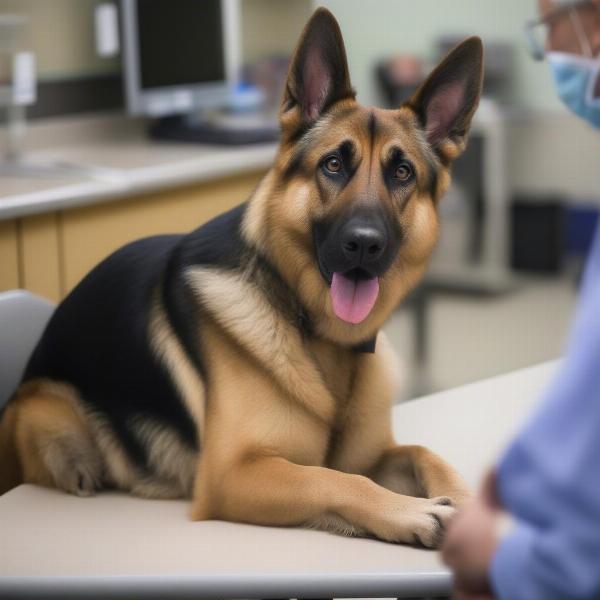German Shepherd mix dogs, often affectionately called Shepherd mixes, are captivating canines that inherit a blend of traits from their German Shepherd parent and another breed. These unique mixes offer a diverse range of appearances, temperaments, and sizes, making them a popular choice for many dog lovers. Whether you’re considering adding a Shepherd mix to your family or simply curious about these fascinating dogs, this article will delve into everything you need to know, from breed variations to health considerations and training tips.
Unraveling the German Shepherd Mix: Breed Variations and Characteristics
Shepherd mixes come in a stunning variety of shapes and sizes, depending on the other breed in the mix. A German Shepherd mixed with a Golden Retriever, for instance, might result in a dog with a gentler temperament and a longer, golden coat. Conversely, a German Shepherd-Husky mix could inherit the striking blue eyes and thick fur of the Husky, combined with the loyal and protective nature of the German Shepherd. This variety makes each Shepherd mix truly unique, and understanding the potential influence of each parent breed is crucial when choosing a mix that suits your lifestyle.
Health and Care for Your German Shepherd Mix
Like all dogs, German Shepherd mixes are susceptible to certain health conditions. While mixed breeds often benefit from hybrid vigor, which can reduce the risk of inherited diseases common in purebreds, it’s still essential to be aware of potential health concerns. Hip and elbow dysplasia, common in German Shepherds, can also occur in mixes. Regular veterinary checkups, a balanced diet, and appropriate exercise are vital for maintaining the health and well-being of your Shepherd mix.  German Shepherd Mix Dog at the Vet
German Shepherd Mix Dog at the Vet
Training and Socialization: Shaping a Well-Behaved Companion
German Shepherds are renowned for their intelligence and trainability, and these traits often carry over to their mixes. Early socialization and consistent training are crucial for shaping a well-behaved and well-adjusted Shepherd mix. Positive reinforcement methods, such as rewarding desired behaviors with treats and praise, are generally very effective. Are you prepared to dedicate time and effort to training and socialization? This commitment is essential for nurturing a happy and harmonious relationship with your Shepherd mix.
Nutritional Needs of a German Shepherd Mix
Providing a balanced diet tailored to your Shepherd mix’s age, activity level, and specific needs is vital for their health and vitality. High-quality dog food formulated for large breeds is often a good starting point. However, consulting with your veterinarian to determine the optimal diet for your individual dog is always recommended. What are the best food options for a German Shepherd mix? This is a common question, and the answer often depends on individual factors such as allergies, sensitivities, and activity levels.
Grooming Your German Shepherd Mix: Maintaining a Healthy Coat
Shepherd mixes typically have a double coat, which requires regular brushing to prevent matting and shedding. The frequency of grooming depends on the specific mix. Some mixes might require daily brushing, while others might only need it a few times a week. Regular grooming not only keeps your dog looking its best but also provides an opportunity to check for skin irritations, parasites, and other potential health issues.
Conclusion: Embracing the Joys of Owning a German Shepherd Mix
German Shepherd mix dogs offer a unique blend of charm, intelligence, and loyalty. From the playful energy of a Shepherd-Labrador mix to the striking beauty of a Shepherd-Husky mix, these dogs bring diverse personalities and appearances to the canine world. By understanding their unique needs and providing proper care, training, and socialization, you can enjoy the rewarding experience of sharing your life with a loving and devoted German Shepherd mix.
FAQ:
-
Are German Shepherd mixes good family dogs? Many German Shepherd mixes are excellent family dogs, especially when properly socialized and trained from a young age. However, individual temperaments can vary, so it’s important to meet the dog and assess its personality before bringing it home.
-
How much exercise does a German Shepherd mix need? German Shepherd mixes generally require a significant amount of exercise to stay healthy and happy. Daily walks, playtime, and mental stimulation are essential.
-
Are German Shepherd mixes easy to train? German Shepherds are known for their intelligence and trainability, and these traits are often passed down to their mixes. With consistent positive reinforcement methods, most Shepherd mixes respond well to training.
-
What is the average lifespan of a German Shepherd mix? The lifespan of a German Shepherd mix can vary depending on factors such as size, health, and genetics. On average, they can live for 10-14 years.
-
How do I choose the right German Shepherd mix for me? Consider your lifestyle, living situation, and experience with dogs when choosing a Shepherd mix. Research different breed combinations and their typical characteristics to find a mix that suits your needs.
-
Where can I adopt a German Shepherd mix? Check local animal shelters, rescue organizations, and breed-specific rescues for German Shepherd mixes looking for loving homes.
-
What are some common grooming needs for a German Shepherd mix? Regular brushing is essential for maintaining a healthy coat and preventing matting.
Related Articles on ILM Dog:
About ILM Dog:
ILM Dog is your trusted global resource for expert advice on dog breeds, health, training, nutrition, grooming, and more. We provide comprehensive and practical information to empower dog owners worldwide. Whether you’re navigating the complexities of puppy care or seeking guidance on senior dog wellness, ILM Dog offers evidence-based insights to support you every step of the way. Contact us at [email protected] or +44 20-3965-8624.